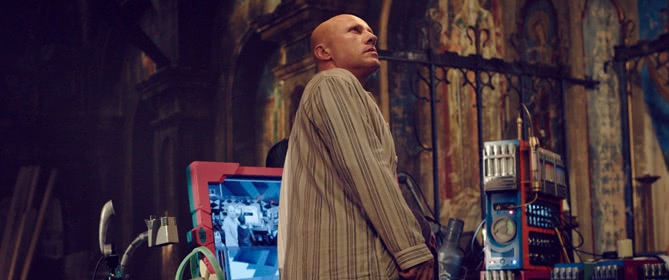InThe Zero Theorem, anxiety-plagued mathematical genius Qohen Leth (Tarantino regular Christoph Waltz) seeks sanctuary from a garish, overwhelming world he doesn’t understand. He finds it when he is assigned to crack The Zero Theorem, essentially a mathematical proof that existence is utterly meaningless. Zero, he is told repeatedly, must equal 100 per cent. Ironically, it’s in the pursuit of the proof of meaninglessness that Qohen finds some kind of personal agency.
It’s a very ‘Terry Gilliam’ story. After all, we’re talking about the former Monty Python member who made Brazil and 12 Monkeys. You may be surprised to learn, then, that the script did not originate with Gilliam, but with first-time screenwriter, Pat Rushin.
“When I first read it,” Gilliam recalls, “it was apparent that Pat Rushin had seen all my films, and the script dealt with ideas that had been popping up throughout my career. It intrigued me, [but] at the same time it terrified me because I knew it would get compared to Brazil and everything else. So I went out of my way to make it unlike Brazil. Brazil was set in a very grey place so I thought, ‘OK, I’ll make this world a very colourful place where people are playing and having a good time and Qohen isn’t.’ And this went on and it became more and more about the world we live in now where everyone is connected.
“Qohen wants to disconnect from that. He really wants to disconnect from the so-called connected world and concentrate on what he thinks is important. He’s a strange character, and what I like about Qohen is that he’s very damaged in the beginning. He’s somebody who’s burned out. He’s somebody who’s alone but ultimately humanity forces itself upon him and he becomes more human. That’s very important, especially now. People seem to exist only as a neuron, a connective tissue between two other people. People are all so connected and it seems like they only exist when they tweet something.
“I can’t imagine what it’s like to be young now, the pressure, because you have to be connected all the time. Your peers are always, ‘Don’t do this!’ or ‘Don’t do that!’ or ‘Oh, you’ve hurt my feelings!’ so you don’t say anything offensive that may cause anyone any pain. That sounds horrible to me. It’s like, ‘Here I am! Don’t you think I’m exciting? Don’t you think I’m interesting? Don’t you think I have exciting ideas and opinions?’ When you’re living like that, you’re so desperate to be seen to be smart or successful or whatever.”
He pauses, then laughs: “I’ve become a curmudgeon – a modern curmudgeon.”
You can hardly blame Gilliam for being grumpy. His career has been characterised by a seemingly never-ending series of uphill battles to be understood, to be heard, or even just to make a damn film. Still, Gilliam maintains that he feels no regrets.
“No, no,” he says. “I really don’t. The minute something doesn’t work or something falls through, I never think about it again. I really don’t look back.”
He does get annoyed, however, when his work is misinterpreted. “When people say that The Zero Theorem is a futuristic or sci-fi film – it’s not! I wanted to make a comment about the world we’re living in now; about corporations and the power they have, especially with the gathering of information. I mean, you have the NSA gathering so much information, but Google and Amazon are gathering even more.
“You know what’s interesting?” he asks. “The number of people who don’t get it at all; who don’t understand what the film is, or who complain that the Python jokes aren’t working. What Python jokes? There’s humour, but there aren’t jokes. It’s a tragicomedy.”
The Zero Theorem is in cinemas now.


































